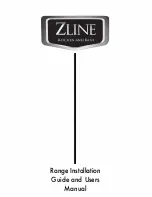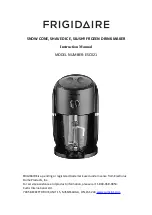
7
6
Warnings
Getting
Started
Getting
Started
To Prevent Fire or Smoke Damage
• Be sure all packing materials are removed from the appliance before
operating it.
• Keep area around appliance clear and free from combustible materials,
gasoline, and other flammable vapors and materials.
• If appliance is installed near a window, proper precautions should be taken
to prevent curtains from blowing over burners.
•
NEVER
leave any items on the rangetop. The hot air from the vent may ignite
flammable items and may increase pressure in closed containers which may
cause them to burst.
• Many aerosol-type spray cans are EXPLOSIVE when exposed to heat and
may be highly flammable. Avoid their use or storage near an appliance.
• Many plastics are vulnerable to heat. Keep plastics away from parts of the
appliance that may become warm or hot.
DO NOT
leave plastic items on
the rangetop as they may melt or soften if left too close to the vent or a
lighted surface burner.
• Combustible items (paper, plastic, etc.) may ignite and metallic items
may become hot and cause burns.
DO NOT
pour spirits over hot foods.
In Case of Fire
Turn off appliance and ventilating hood to avoid spreading the flame. Extinguish
flame then turn on hood to remove smoke and odor.
• Smother fire or flame in a pan with a lid or cookie sheet.
DO NOT
use water
on grease fires. Use baking soda, a multipurpose dry chemical or foam-type
extinguisher to smother fire or flame Let fat cool before attempting to
handle it.
DO NOT
allow grease to collect in vents. Wipe up spillovers
immediately.
• NEVER
pick up or move a flaming pan.
• GREASE–Grease is flammable and should be handled carefully.
DO NOT
use water on grease fires. Flaming grease can be extinguished with
baking soda or, if available, a multipurpose dry chemical or foam type
extinguisher. Let fat cool before attempting to handle it. Wipe up
spillovers immediately.
Child Safety
• NEVER
leave children alone or unsupervised near the appliance when it is in
use or is still hot.
• NEVER
allow children to sit or stand on any part of the appliance as they
could be injured or burned.
•
DO NOT
store items of interest to children over the unit. Children climbing to
reach items could be seriously injured.
Child Safety
(cont.)
• Children must be taught that the appliance and utensils in it can be hot.
Let hot utensils cool in a safe place, out of reach of small children.
Children should be taught that an appliance is not a toy. Children should not
be allowed to play with controls or other parts of the appliance.
Cooking Safety
• To eliminate the hazard of reaching over hot surface burners, cabinet
storage should not be provided directly above a unit. If storage is provided,
it should be limited to items which are used infrequently and which are
safely stored in an area subjected to heat from an appliance. Temperatures
may be unsafe for some items, such as volatile liquids, cleaners or
aerosol sprays.
•
ALWAYS
place a pan on a surface burner before turning it on. Be sure
you know which knob controls which surface burner. Make sure the correct
burner is turned on and that the burner has ignited. When cooking is
completed, turn burner off before removing pan to prevent exposure to
burner flame.
•
ALWAYS
adjust surface burner flame so that it does not extend beyond the
bottom edge of the pan. An excessive flame is hazardous, wastes energy
and may damage the appliance, pan or cabinets above the appliance.
This is based on safety considerations.
• NEVER
leave a cooking operation unattended especially when using a high
heat setting or when deep fat frying. Boil overs cause smoking and greasy
spillovers may ignite. clean up greasy spills as soon as possible.
DO NOT
use high heat for extended cooking operations.
• DO NOT
heat unopened food containers, build up of pressure may cause
the container to explode and result in injury.
• Use dry, sturdy pot-holders. Damp pot-holders may cause burns from steam.
Dishtowels or other substitutes should
NEVER
be used as potholders
because they can trail across hot surface burners and ignite or get caught on
appliance parts.
•
ALWAYS
let quantities of hot fat used for deep fat frying cool before
attempting to move or handle.
•
DO NOT
let cooking grease or other flammable materials accumulate in or
near the appliance, hood or vent fan. Clean hood frequently to prevent
grease from accumulating on hood or filter. When flaming foods under the
hood, turn the fan off.
•
NEVER
wear garments made of flammable material or loose fitting or
long-sleeved apparel while cooking. Clothing may ignite or catch utensil
handles.
•
PREPARED FOOD WARNING:
Follow food manufacturer's instructions. If a
plastic frozen food container and/or its cover distorts, warps, or is otherwise
Warnings


































